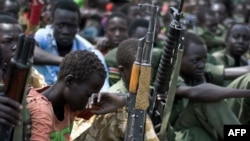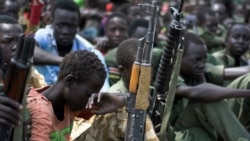“UN member states must be held to the highest standards and – at an absolute minimum – we must ensure that national armed forces do not unlawfully recruit and use children,” said U.S. Alternate Representative to the United Nations for Special Political Affairs Ambassador David Pressman.
“[The United Nations] make[s] choices about international responses to conflict through our resolutions, the work of our peacekeepers, the weight of our sanctions and, sometimes tragically, through our inaction. We have a duty to make choices so that children do not face impossible ones,” he said.
In 2008, the Child Soldier Prevention Act was signed into law in the United States. This law requires the publication of an annual list of countries whose governments unlawfully recruit and use child soldiers, or governments that support armed groups that do so.
“Public listings and assistance restrictions, in coordination with the concerted engagement of other member states and international actors, are useful tools and have helped encourage governments to take important action,” said Ambassador Pressman.
There is more the United Nations can do in the common cause for children.
“First, we can insist on strong human rights reporting in peacekeeping missions,” said Ambassador Pressman. “Second, we can ensure that child protection issues are on the table during the difficult work of negotiating peace agreements. Third, we must be ready to receive children coming out of conflict with more robust disarmament, demobilization, and reintegration programs.”
Children are also being lured into war zones to join terrorist organizations committed to a barbaric and violent confrontation with humanity and modernity.
“We are increasingly seeing young people go to great lengths to join organizations intent on fomenting violence and instilling terror,” said Ambassador Pressman. “Whether victimized by terrorists or exploitative governments or armed groups, children deserve and need our protection.”






